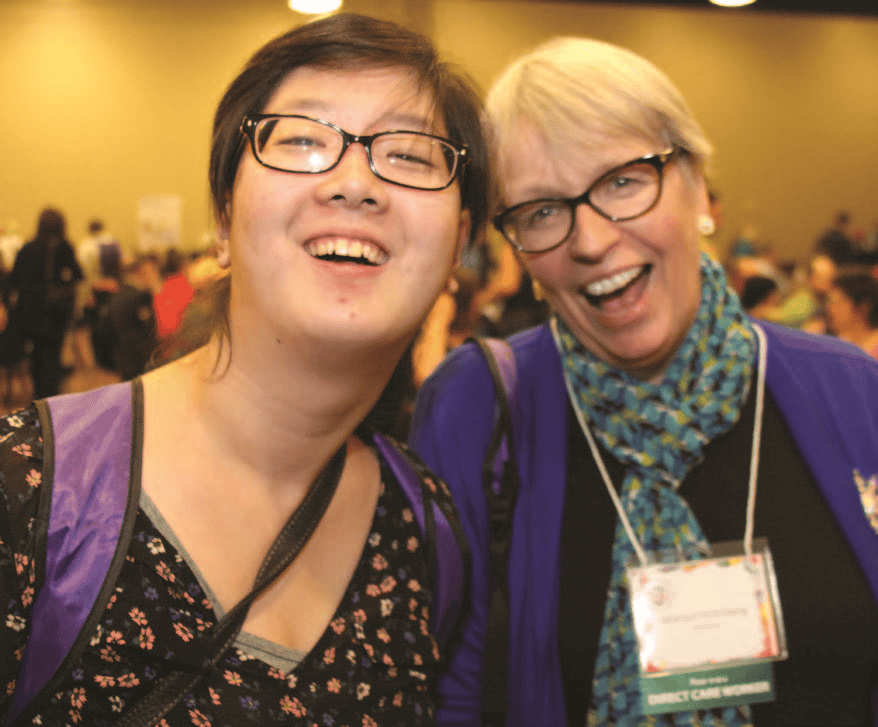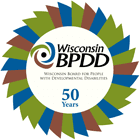Building Community
Relationships: Individuals
Why Building Community Relationships Matters to Individuals
Building community relationships is talking with self-advocates and everyone involved in the lives of people with disabilities. It is very important for making sure that plans and services will help people with disabilities live better lives. This includes not just people with disabilities, but also their families, the people who care for them, and the people who make the rules. To do this well, groups need to meet, talk and work together at different levels – with the person, with the groups that help them, and with the people who make the decisions at the state level. It is important to bring groups together so everyone can share their ideas and tell the people making decisions what is important to them. Self-advocates play the most important role. You are able to share your lived experience and need to be at all the tables where important conversations are happening. Your input on how policies and practices will affect your lives is so important. Self-advocates should seek out these opportunities to be an “expert” in what is important in their lives.
Self-advocates can have the following roles in the process of building community relationships:
• Advocate: Self-advocates with disabilities should advocate for their own needs and the needs of the community. They can actively participate in meetings, share their experiences, and advocate for policies and services that improve their lives.
• Collaborator: You should actively engage in shared efforts with agencies and other community members. Share your expertise and insights to contribute to the development of good solutions.
• Information Provider: Be willing to provide information, feedback, and input when requested by agencies and policymakers. Share personal experiences to highlight the impact of policies and services on individuals with disabilities.
• Supporter: Support other individuals with disabilities to engage or talk with others. Create networks and support groups to strengthen the voice of people with disabilities.
The Living Well grant used a consortium of community members to engage many different people at all levels on the work of the grant including self-advocates. This work included 11 self-advocates leaders who worked with the grant to provide peer education, create plain language resources, and share their life experiences with systems.
How Individuals Can Be a Part of Building Community Relationships
Inclusivity: Make sure that the groups you join have many individuals with disabilities from different backgrounds and these people are actively engaged in the group. This includes people from different cultural backgrounds, races, sexual orientation, and socioeconomic status.
Open Communication: Always talk honestly with everyone. Be sure that the group involves you and makes sure you understand the goals and expectations of the group.
Accessibility: Make sure that you are able to take part in the work. This means being sure the group provides plain language documents, interpretation, or websites that everyone can use. This will help make sure that self-advocates are able to add their voice.
Active Role: Be sure you have a real role in making decisions and feeling like you are part of the project. The group should listen to your concerns and ideas.
Show Respect: Be sure that everyone is treated with respect and values your knowledge and personal experiences.
Be Ready to Change: The group should understand that everyone is different and be prepared to adjust the plans to fit what people need and want.
Keep the Conversation Going: Have a way for you to give your thoughts and stay updated about what’s happening. Make sure your feedback is considered when the group is making decisions.
Tools for Individuals
Plain Language – Learn about how to use plain language materials to ensure
information is accessible to all individuals, regardless of their reading level or cognitive abilities.
Partners in Policymaking – 35 states host these advocacy and systems change training programs. The program develops future leaders across the states who are able to work with legislators and communities on policies and initiatives to support the full inclusion of people with developmental disabilities in all aspects of life.
Green Mountain Self-Advocates Training – They offer a variety of trainings on topics including working with peer groups, plain language, and abuse/neglect prevention.
The Self-Determination Channel – The channel hosted by WI BPDD is dedicated to sharing the voices of people with disabilities about making choices and speaking up for themselves. They celebrate successes and show that, through perseverance, anything is possible.
Self-Advocacy Resource and Technical Assistance Center (SARTAC) – The oldest national self-advocate organization with the mission to strengthen the self-advocacy movement by supporting self-advocacy organizations to grow in diversity and leadership. They offer trainings and resources to help educate people with disabilities.
People First Wisconsin – Collaborate with People First Wisconsin to further
the goals of self-advocacy and support the rights of individuals with disabilities.
LEND (Leadership Education in Neurodevelopmental and Related Disabilities) – Explore LEND programs, which offer leadership education and training opportunities to individuals with disabilities and their families.
Reflection Activity
Download the Reflection Activity to make your Building Community Relationships Plan!

Navigate the Blueprint
Self-Advocates Speak on a Panel at a Living Well Consortium Meeting:
Real Lives. Real Connections.
“Self-advocates need to be a part of supporting other people with disabilities and people in general because if we don’t tell our stories and share our voices, who will? Nobody can say what we’ve been through and the impact it’s had on our lives better than we can.”
-Living Well Self-Advocate Leader

